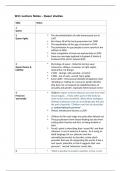W11 Lecture Notes – Queer studies
Slide Notes
1
Queer
2 The decriminalisation of male homosexual acts in
Queer rights 1967
But clause 28 of the local government act 1988
The equalisation of the age of consent in 1994
The permission for gay people to serve openly in the
military in 2000
State recognition of same-sex partnerships in 2005
Same-sex marriage legalised in England & Wales &
Scotland 2014 and N. Ireland 2020
3 Etymology of queer - linked to German quer
Queer theory & transverse, oblique, crosswise, at right angles,
LGBTQ+ obstructive, (of things)
C16th - strange, odd, peculiar, eccentric
C18th - out of sorts, unwell, faint, giddy
Early C20th - Homosexual (initially derogatory); later
'denoting or relating to a sexual or gender identity
that does not correspond to established ideas of
sexuality and gender, especially heterosexual norms'
4 Children 'expect to derive pleasure not only form their
Freud on sexual organs ... Many other parts of the body lay
'perversity' claim to the same sensitivity, afford them analogous
feelings of pleasure and can accordingly play the part
the part of genitals.' Children may thus be described
as 'polymorphously perverse'.
(Freud, Introductory lectures, p.209)
Children in this early stage are quite often blissed out.
They get pleasure from breast-feeding but also from
sucking their thumbs and feet, or being stroked or
held.
Freud's point in describing their 'sexual life' and their
'pleasure' is not as weird as it seems - he is using an
adult language (of sex, pleasure and also
normality/perversity) to describe a state which
precedes that way of categorising the world. It has a
real 'queer' potential, in that it suggests that 'non-
perverse', 'normal' behaviour comes late.
5 'What is peculiar to modern societies, in fact, is not
, Michel Foucault that they consigned sex to a shadow existence, but
1926-1984 that they dedicated themselves to speaking of it ad
infinitum, while exploring it as the secret.'
Extract from The History of Sexuality, vol 1 in ed Paul
Rabinow, The Foucault Reader, (London: Penguin,
1984), p.316
6 Homosexuality appeared as one of the forms of
Foucault on 'the sexuality when it was transposed from the practice of
homosexual' sodomy onto a kind of superior androgyny, a
hermaphroditism of the soul. The aberration; the
homosexual was now a species.
Extract From The Foucault Reader pp, 322-3
7 Scholar in the fields of gender studies, queer theory
Eve Kosofsky and affect theory.
Sedgwick (1950- Focussed on 19th Ce writing, especially the novel.
2009) Books include Epistemology of the Closet (1990),
Tendencies(1993), A Dialogue on Love (1999) ,
Touching Feeling (2003)
8 As far as 'having sex' goes, things couldn't possibly be
How do we link more hygienic or routinized for me. When I do it, it's
identity and desire vanilla sex, on a weekly basis, in the missionary
position, in daylight, immediately after a shower, with
one person of the so-called opposite sex, to whom I've
been legally married for almost a quarter of a century.
Eve Sedgwick, A Dialogue on Love (Beacon Press,
1999), p44.
9 1. People are different from each other
Axiomatics 2. The study of sexuality is not co-extensive with the
study of gender ... But we can't know in advance how
they will be different
3. There can't be an a prior decision how far it will make
sense to conceptualize lesbian and gay male identities
together. Or separately.
4. The immemorial, seemingly ritualized debates on
nature versus nurture take place against a very
unstable background of tactic assumptions and
fantasies about both nurture and nature.
10 "over and over i have felt in writing the books that,
Essentialism / however my own identifications, instructions,
Constructivism institutions, circumstances, limitations and talents
may have led its interpretations to privilege
constructivist over essentialist, universalizing over




